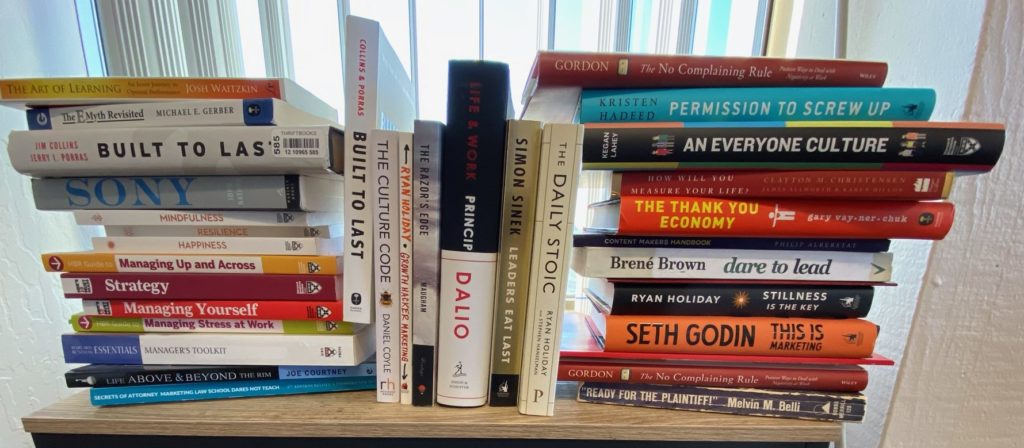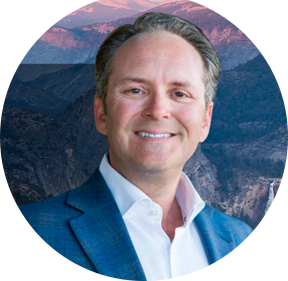Many of us have found ourselves with extra time on our hands as we stay inside in order to flatten the curve. It’s the perfect time to get some reading done. Here are a few books that will truly keep your attention and that have really resonated with me. These books showcase some great advice regarding developing leadership, instilling a customer service culture in your company, and the best mindset to adopt when approaching your business.
The Infinite Game, Simon Sinek
Simon Sinek is an author I really admire. I included his book “Leaders Eat Last” in my first top ten list of the most influential books I’ve read. This one has been just as mind-opening and business changing for me. The premise of “The Infinite Game” is that the world is full of games, some finite (think baseball and backgammon) and others infinite (think business and politics). Sinek explains that finite games are the ones we think about most readily. They are the ones where we know the players, we’re clear on the rules, and there are definite winners and losers. Infinite games, however, are trickier. The players change, the rules change, and you never win or lose — you are only ahead or behind. Sinek’s point is that business leaders usually have a mindset that business is a finite game and conduct themselves as such. But it’s not true. Understanding business as an infinite game completely changes how leaders act. They are more resilient. They are more innovative. They are more inspiring. This book made me rethink many of my assumptions and the thinking behind the decisions I was making. I began to ask myself “how can I become a more infinite thinker.”
Permission to Screw Up: How I Learned to Lead by Doing (Almost) Everything Wrong, Kristen Hadeed
Some people are born leaders. Some people learn it as they go. When we’re lucky, the best leaders write about what they do right to inspire the rest of us. When we’re really lucky, they write about what they did wrong to show us that you don’t have to be perfect to be a great leader. Kristen Hadeed falls into that last category. Her book is a how-not-to in running a company. But she was open enough to learn from each of her mistakes and has built a company with a solid reputation in their ability to retain employees and for operating with a culture of trust and accountability. She shares those mistakes, and the lessons she learned along the way, with us here. It encourages all of us to go for it and reminds us that we don’t have to be perfect to be a leader. In fact, perfection is often intimidating and cold, while honest mistakes that are corrected openly and with accountability make a leader that people trust and admire. This book reinforced to me that, if we as leaders are open about our mistakes and how we work hard to rectify them, we empower our employees to do the same thing.
Great customer service is something that all companies should deliver, but most rarely do. In this book, Solomon talks to all the customer service greats. Zappos CEO Tony Hsieh. Virgin’s Richard Branson. Caesar’s International EVP (and former mayor of Las Vegas) Jan Jones Blackhurst. He has also compiled customer service tales across industries from companies like Amazon, Drybar, Cleveland Clinic, USAA, and The Ritz-Carlton Hotel. He’s done all of this methodical work to help you transform the way your company handles customer service. One customer service interaction can turn a ho-hum customer into a lifetime brand advocate if handled correctly. Solomon, a well-respected customer service and customer experience consultant, shows you how you can use the principles advocated by these companies to transform your company’s culture to one that is more customer-centric. As a big company culture advocate myself, this really resonated with me and reminded me that we got into this business for the people we serve and, if our customer interactions aren’t up to par, then it’s the first thing we need to work on.
The Joe Rogan Experience: Matthew Walker
How well are you sleeping through the pandemic? If you’re like me, not as well as normal. I’ve gone back to revisit quite a bit of Matt Walker’s work to help me back to 8 hours. Sleep is the elixir of life. These wise words were spoken by renowned sleep expert and neuroscientist Dr. Matthew Walker on an episode of The Joe Rogan Experience in 2018 and they’ve stuck with me ever since.
Walker is the world’s foremost expert on sleep and the author of Why We Sleep. His research on Sleep, or the lack of it, shows impacts more than you realize. Mental acuity. Weight loss. Decision making. Mortality. Our genes. Our creativity and just about every disease you can think of. As people who want to make the best decisions, marshall our creativity towards the greater good, empower our employees through our example.
Now more than ever, sleep is about the most important thing you can get to help you through this crazy time. No question it’s pretty tough right now. I find myself working more than ever
Walker’s Ted Talk, Sleep is Your Superpower entitled which you can watch by clicking the link is a short version of the book and the podcast (Rogan’s Podcast’s tend to go on a long time.)
____________
Eric Farber is the author of the bestselling book, The Case for Culture, How to Stop Being a Slave to Your Law Firm, Grow Your Practice and Be Happy. Eric is on a mission to change how law firms operate by showing lawyers the value of putting culture first. During his twenty-five years as a lawyer, Eric has lived the transformation from scarcity to abundance that becomes possible when you shift your perspective and prioritize people. As the CEO and chief legal officer of Pacific Workers’ Compensation Law Center, Eric’s focus on culture helped him build a seven-figure firm that’s gone from four people to fifty in just over five years, been an Inc. 5000 company twice, was named to the Bay Area 100 list of fastest-growing companies, and spent two consecutive years in the top fifty of Law Firm 500.
The Case for Culture was named by Forbes Magazine as a Top 8 Book to “Reconsider How You Manage Relationships“.
You can find your copy of the Case for Culture at Amazon, in hardback, paperback or Kindle.


